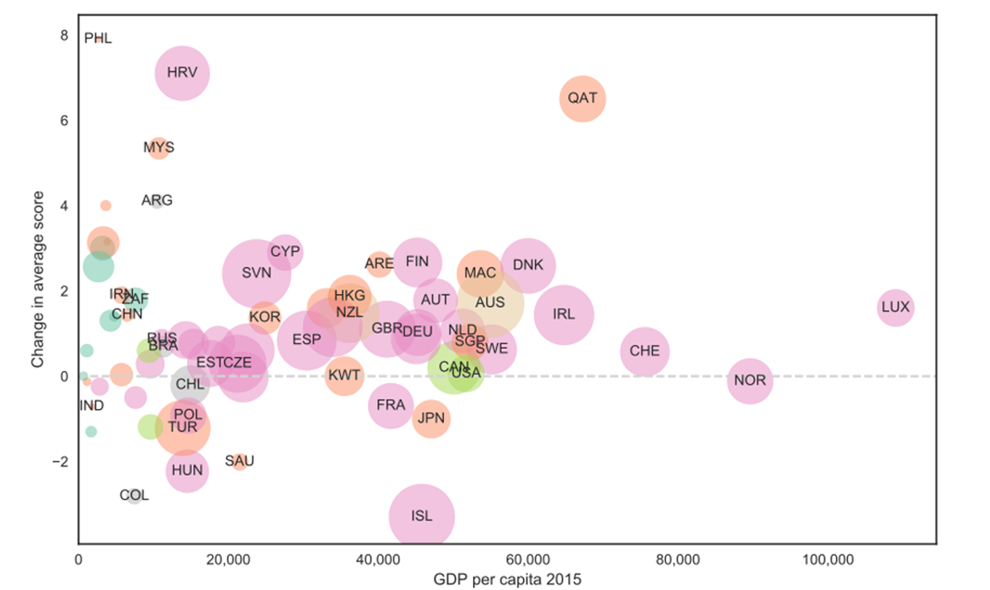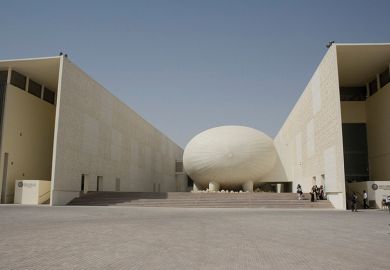Two years ago Times Higher Education announced that Qatar University had topped its list of the world's most international universities.
The amazement among the audience that an institution from outside the higher education powerhouses of the US or UK had claimed top spot was palpable. Qatar University continues to excel on the international outlook indicator and took pole position for the third year running in 2018
A similar sense of wonder was felt last month when Qatar University (QU) hosted a THE data masterclass involving numerous university presidents from across the region.
One of the slides presented at the event, shown below, showed Qatar, as a country, now topped the charts in terms of the change in average score on rankings versus GDP per capita for 2015. In other words, no developed country had improved the performance of its university system as fast as Qatar.

As in 2016 when our university hosted THE's inaugural Middle East and North Africa Universities Summit, I was asked to jump in and explain the reasons behind this surge in Qatar's performance.
As I affirmed back then, Qatar University, as other young universities, are high on these charts thanks to the efforts of the Qatari government to invest its wealth into education and research that are bringing rewards across all spectrums of the society, in addition to the benefits they give to university ranking performance.
Qatar’s performance in rankings is one tangible and sustainable result of these efforts, just as the most remarkable one that is Qatar’s winning bid to host the 2022 FIFA World Cup with the whole country’s infrastructure being geared towards this effort, despite all doubts cast around the capacity of the country to host this event.
This proves the fact that Qatar University’s popping out on top of the charts two years ago, was not down to luck, or the result of a Houdini-inspired trick from our data crunchers.
It was rather a logical result of the nationwide strategy, known as Vision 2030, which aims to transform the economy of one of the richest countries in the world into a knowledge-based economy.
The data above reinforce these facts as it proves that the resources devoted to research (income and PhD students) are increasing while Qatar University is holding the quantity of research output steady, thus the quality goes up, leading to our biggest gain being in citation Impact.
Even in the current difficult times inflicted by the ongoing Gulf Crisis, preceded by the drop in oil prices, resources were not affected.
On the contrary, the general impression is that the resulting blockade served as a catalyst to the implementation of the shift to a knowledge based economy. Small and medium sized enterprises and entrepreneurial efforts are booming yielding immediate results with the Qatari government able to limit the negative effects of the blockade.
The R&D strategy is proving efficient by providing the country with human resources capable of adapting to change quite swiftly and Qatar University, as the national university, serves as an incubator for all these ideas and leads the way in providing significant & useful research.
For that reason, the trend of improvement in scores on ranking for our university has stood the test of time, but it is also bound to be consolidated with the country relying on its own resources to come out stronger from the current situation as Sheikh Tamim bin Hamad Al Thani, the emir of Qatar, defiantly stated in October.
Cesar Wazen is scholarships and partnerships director at Qatar University.
Register to continue
Why register?
- Registration is free and only takes a moment
- Once registered, you can read 3 articles a month
- Sign up for our newsletter
Subscribe
Or subscribe for unlimited access to:
- Unlimited access to news, views, insights & reviews
- Digital editions
- Digital access to THE’s university and college rankings analysis
Already registered or a current subscriber?





